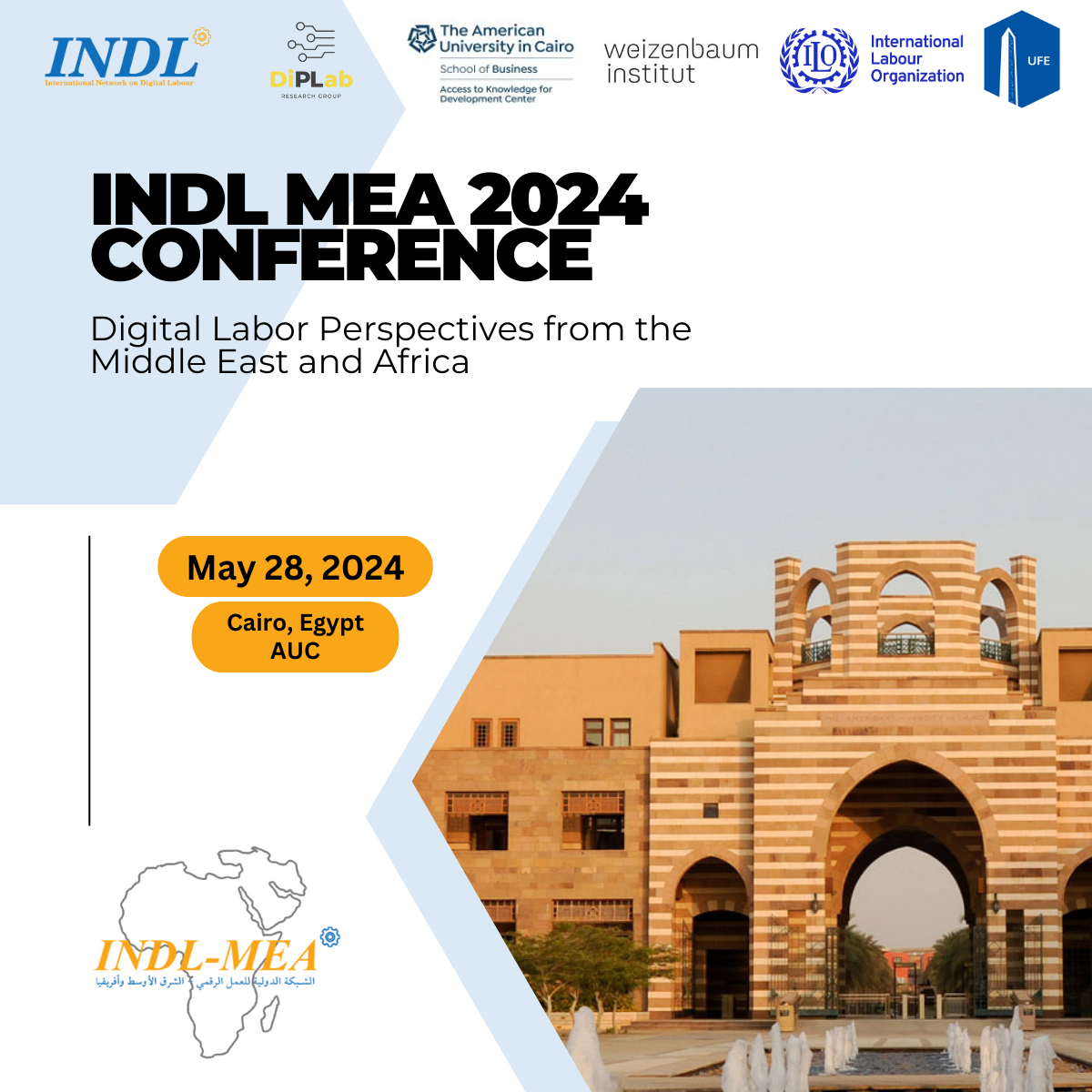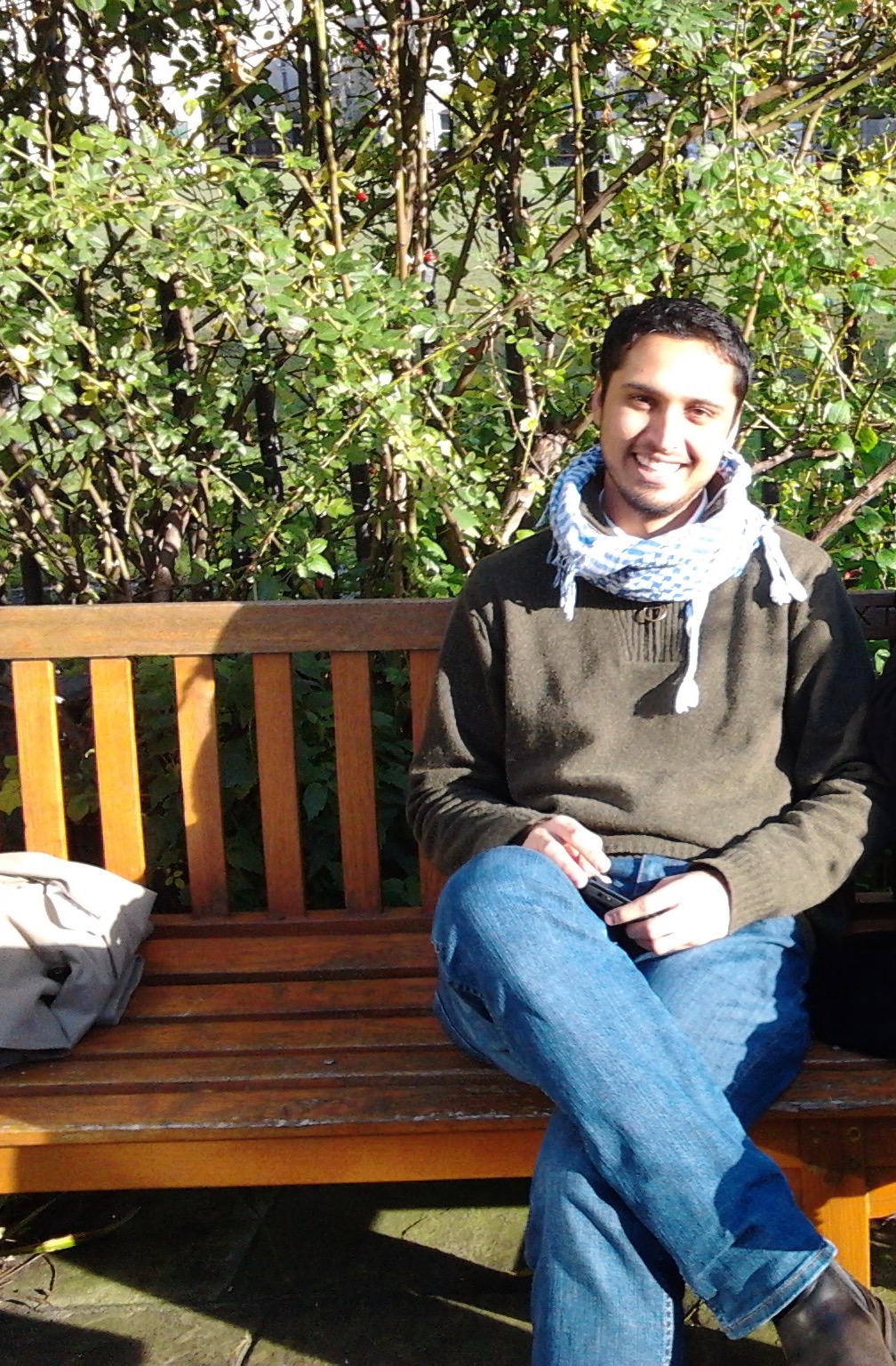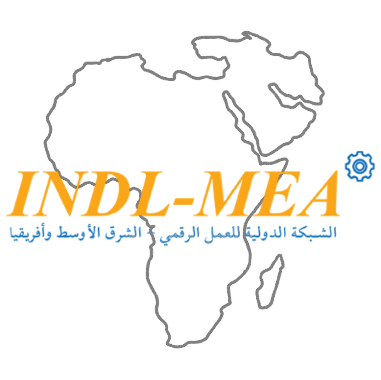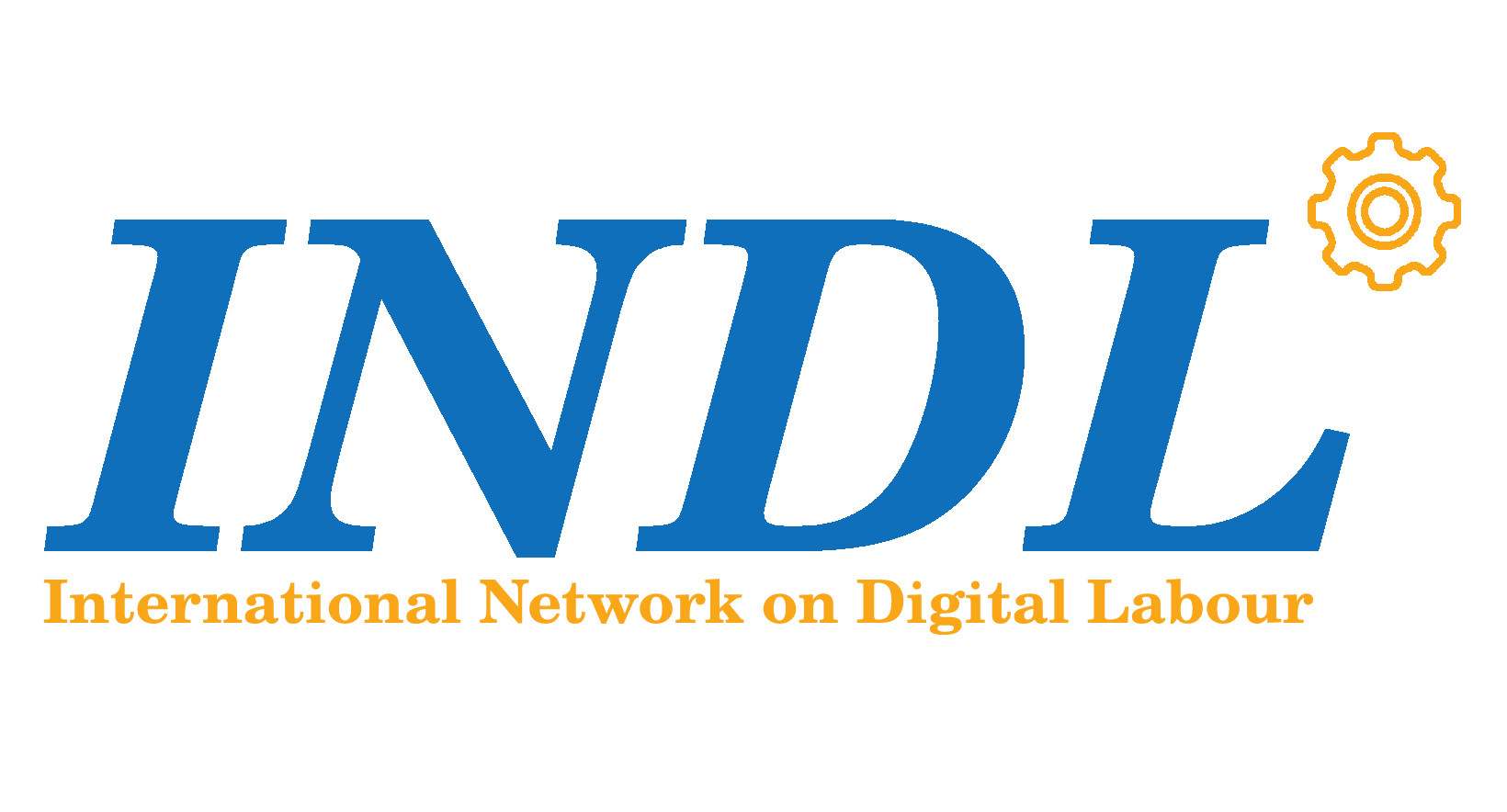#INDL
INDL-MEA conference
28 May 2024, Cairo

Conference program
| Conference Program for INDL-MEA1 Digital Labor Perspectives from the Middle East and Africa |
||
|---|---|---|
| 28th of May 2024 at the American University in Cairo, New Cairo Campus | ||
| 09:00-09:30 | Registration | |
| 09:30-10:00 | Welcome and Introduction Antonio Casilli, Paris Telecom. Sarrah Kassem, University of Tübingen. Eric Oechslin, Director of ILO's Country Office for Egypt and Eritrea, and Decent Work Team for North Africa. Samer Atallah, Associate Dean, Business School, The American University in Cairo |
|
| 10:00-10:45 | Keynote: AI, Work and Inclusion in the Middle East and Africa Nagla Rizk, The American University in Cairo Chair: Sarrah Kassem, The University of Tübingen |
|
| 10:45-11:00 | Coffee Break | |
| 11:00-12:15 | Parallel Sessions | |
| Session 1: Disrupting different industries and sectors Chair: Antonio Casilli, Télécom Paris | Session 2: Platforms and Informality Chair: Paola Tubaro, Centre National de la Recherche Scientifique |
|
| Amina Achmaoui & Hafssa Yerrou & Benrokiya Oumaima Fidélisation des clients dans l'E-Banking: Cas des banques marocaines | Amal Mowafy & Nagla Rizk Platform Work, Social Protection and Representation: A Case of Egyptian Delivery Workers |
|
| Sonia Bourass L'impact des TIC sur le lien de subordination en droit du travail marocain : renforcement ou fragilisation ? | Saadeddine Igamane & Fidae El Hassouni A Case Study on Social Norms in Women’s Informal Digital Labor |
|
| Asma Ben Hassen Nouvelles formes de travail, anciennes formes d'exploitation : Emploi informel et économie des plateformes en Tunisie | استجابات السياسات لتحول العمالة الرقمية والتشغيل الآلي في منطقة الشرق الأوسط وأفريقيا Elhafad Nouini | |
| 12:15-13:20 | Lunch Break | |
| 13:20-14:05 | Keynote: African Work Futures in the Digital Age Mohammad Amir Anwar, The University of EdinburghChair: Iraklis Vogiatzis, Hellenic Open University |
|
| 14:05-14:15 | Short Break | |
| 14:15-15:45 | Session 3: Labor Realities & Mobilizations across MEA Chair: Myriam Raymond, Université d’Angers |
|
| Ida Nikou Beyond the App: Decoding Snapp!‘s Rise and Labor Dynamics in Iran’s Largest Startup |
||
| Shaibu Bukari Vulnerabilities among digital platform workers during Coronovirus pandemic: An exploratory study of ride hailing drivers in Ghana |
||
| Ahmad M. Awadn & Olivia Odell & Marah Abbas & Morad KotkotDigital Platform-Based Work in Jordan | ||
| 15:45-16:15 | Poster session and Coffee Break | |
| Posters (fr): Kawtar Tsouli Défis imposés par l'IA au travail humain au Maroc à la lumière de la crise qui connaît le secteur éducatif Posters (eng): Hanan Abdel Rahman The Impact of Integrating Algorithm Management in Human Resource Management in Selected Orgations in Egypt |
||
| 16:15-17:45 | Roundtable: Promoting inclusion and decent work in digital jobs Uma Rani, Senior Economist, ILO Mostafa Essa, Digital Transformation Expert, Egypt Hoda Dahroug, Advisor, Ministry of Communications and Information Technology of Egypt Nora Toma, Deputy Chief Executive Officer, Education for Employment, Egypt Iman Raslan, Regional Vice President Africa at Udacity, EgyptChair: Zulum Avila, Employment Strategies Specialist in the Digital Economy, ILO |
|
| 17:45-18:00 | Wrap Up and Closing Remarks Paola Tubaro and Myriam Raymond |
|
Nagla Rizk
AI, Work and Inclusion in the Middle East and Africa
Nagla Rizk is Professor of Economics and Founding Director of the Access to Knowledge for Development Center (A2K4D) at the American University in Cairo’s School of Business. Nagla’s area of research, teaching and advocacy is the economics of knowledge, technology and development, with focus on governance of responsible data and Artificial Intelligence, fair work in the platform economy, innovation, gender and inclusion in Egypt, the Middle East and North Africa (MENA). Among a wide range of current activities, Nagla leads the MENA AI Observatory, the MENA Hub for Feminist AI Research (f<a+i>r) network, and the North Africa hub of the Open African Innovation Research Partnership (Open AIR). She led the Egypt team within the Fairwork project, in partnership with the Oxford Internet Institute, having published the Egypt Fairwork Ratings 2021, 2022/23, and Fairwork in the Domestic Platform Work in MENA 2022. Nagla is a member of the Technical Secretariat of Egypt’s National Council for Artificial Intelligence and is a major contributor to Egypt’s AI Strategy. Her authored works include “Artificial Intelligence and Inequality in the Middle East” in the
Oxford Handbook of Ethics of Artificial Intelligence (2020) and the “State of Open Data in the Middle East and North Africa” in The State of Open Data, Histories and Horizons (2019).

Mohammad Amir Anwar
African Work Futures in the Digital Age
Mohammad Amir Anwar teaches at the University of Edinburgh. His research deals with work, labour markets, and economic change within the context of digital revolutions. He is particularly interested in the value chains of artificial intelligence (AI) and the role of behind-the-scenes human labour for AI, platform economy, and their implications on labour market transformations, inequalities, and precarity in an AI-centred world from the majority world contexts. He is the co-author of ‘The Digital Continent: Placing Africa in Planetary Networksof Work’ (OUP). He is an Editor of Critical African Studies journal and also sits on the Editorial Board of Platform and Society.

Call for papers
Call for Papers: 1st INDL-Middle East and Africa conference
Digital Labor Perspectives from the Middle East and Africa
Cairo, Egypt 28 May 2024
International Network on Digital Labor (INDL) and the Access to Knowledge for Development Center (A2K4D) at The American University in Cairo’s School of Business are excited to invite you to the inaugural conference of the Middle East and Africa (MEA) chapter of INDL titled “Digital Labor Perspectives from the Middle East and Africa.” Organized in collaboration with the International Labour Organization (ILO), Digital Platform Labor (DiPLab), Weizenbaum Institute and Université française d’Egypte, this conference will be held on May 28, 2024, in Cairo, Egypt.
Rationale
Digital labor is at the heart of our evolving economies. To address the specific challenges and developments in the Middle East and Africa (MEA), we are launching a dedicated chapter of INDL for the region.
This conference provides a unique platform to present research related to the MEA region, both ongoing and/or burgeoning. The conference offers opportunities for scholars and practitioners to engage with topics such as platformization, automation, gig economy dynamics, and technology-mediated labor.
INDL-MEA will feature three tracks: one in Arabic, one in English, and one in French, reflecting the linguistic diversity of the region.
Topics
Submissions must be in reference to the MEA region, for instance: in perspective, case studies, or focus.
Submission topics may include but are not limited to
- Case studies examining platforms, gig economy workers, and online digital labor in MEA
- Exploring algorithmic management practices in work processes, recruiting, and HR in MEA
- Issues of digital platform labor on gender and inclusion in the MEA region.
- Consequences of the shift to digital labor on workers, businesses, economies, and labor markets in MEA
- Effects of remote work and digital labor on employee well-being and productivity in MEA
- Policy responses to the rise of digital labor and automation in MEA, including regulatory measures and government intervention
- Strategies for organizing digital workers and managing geographically distributed workforces in MEA
- Intersectional perspectives on digital labor in MEA
- Exploring AI and digital labor through a decolonial lens in MEA
- Challenges posed by Generative AI to human labor in MEA
Submissions
We invite submissions of anonymized abstracts for papers, case studies, and policy briefs related to these topics. Abstracts, up to 500 words, can be submitted in Arabic, English, or French through our website INDL-MEA. The submission deadline is January 15, 2024. Selected participants will be notified of acceptance by January 31, 2024.
Important Dates
- Deadline for submissions:
January 15, 2024January 31, 2024 - Acceptance notification:
January 31, 2024February 15, 2024 - Registration opens: TBA
- INDL-MEA conference date: May 28, 2024
We are enthusiastic about the prospect of your valuable contributions. Together, let’s foster a thought-provoking dialogue and contribute to shaping the future of digital labor in the Middle East and Africa.
Special Opportunity
Our conference is co-located with Conf-IRM. We encourage you to consider participating in the Conference on Information Resource Management (Conf-IRM), taking place at the same time as our event at the American University in Cairo (26-28 May 2024). It offers a unique chance for continued networking and knowledge exchange. Please note that registration for Conf-IRM is separate.
Contact
If you have any questions you may email us at contact@indl.network
We look forward to receiving your submissions and to fostering an engaging and thought-provoking discussion at the conference.
Appel à contributions (abstracts)- Conférence INDL-MEA 1
Perspectives du travail numérique en Afrique et au Moyen-Orient (AMO)
Le Caire, Égypte 28 mai 2024
Le Réseau international sur le travail numérique (INDL – International Network for Digital Labor) et le Access to Knoweldge for Development Center (A2K4D) de l’Université Américaine du Caire ont le plaisir de vous inviter à la conférence inaugurale du chapitre Afrique et Moyen-Orient et Afrique (AMO) de l’INDL intitulée “Digital Labor Perspectives from the Middle East and Africa” (Perspectives du travail numérique au Moyen-Orient et en Afrique). Organisée en collaboration avec l’Organisation Internationale du Travail (ILO – International Labour Organization) et Digital Platform Labor (DiPLab), Weizenbaum Institute, et Université française d’Egypte, cette conférence se tiendra le 28 mai 2024 au Caire, en Égypte.
Objet de la conférence
Le travail numérique est au cœur de nos économies en pleine évolution. Pour répondre aux défis et aux développements spécifiques du Moyen-Orient et de l’Afrique, nous lançons un chapitre dédié de l’INDL.
Cette conférence offre une plateforme unique pour présenter des recherches liées à la région AMO, qu’elle soit en cours ou en préparation, offrant ainsi aux participant.es des opportunités de s’engager sur des sujets tels que la plateformisation, l’automatisation, la dynamique de l’économie à la demande, et le travail médiatisé par la technologie.
INDL-MEA proposera trois tracks : un premier en arabe, un second en anglais et un troisième en français, reflétant la diversité linguistique de la région.
Thèmes de la conférence:
Les soumissions doivent faire référence à la région Afrique Moyen Orient, par exemple en termes de perspective, d’études de cas ou d’orientation.
Les sujets de soumission peuvent inclure, mais ne sont pas limités à
Des études de cas examinant les plateformes, les travailleurs de l’économie à la demande et le travail numérique en ligne dans la région AMO.
Exploration des pratiques de gestion algorithmique dans les processus de travail, le recrutement et les RH dans la région AMO.
Les études sur le genre et l’inclusion par les plateformes digitales en AMO.
Conséquences du passage au travail numérique sur les travailleurs, les entreprises, les économies et les marchés du travail en AMO.
Effets du travail distanciel et du travail numérique sur le bien-être et la productivité des employés en AMO.
Les réponses politiques à l’essor du travail numérique et de l’automatisation en AMO, y compris les mesures réglementaires et l’intervention du gouvernement.
Les stratégies d’organisation des travailleurs numériques et de gestion des effectifs géographiquement répartis dans la région AMO.
des perspectives intersectionnelles sur le travail numérique dans l’AMO
Exploration de l’intelligence artificielle (IA) et du travail numérique à travers un prisme décolonial dans l’AMO
Les défis posés par l’IA générative au travail humain dans l’AMO
Soumissions
Nous vous invitons à soumettre des résumés anonymes d’articles, d’études de cas et de notes d’orientation sur ces sujets. Les résumés, d’une longueur maximale de 500 mots, peuvent être soumis en arabe, en anglais ou en français via notre site web INDL-MEA. La date limite de soumission est fixée au 15 janvier 2024. Les participants sélectionnés seront informés de leur acceptation au plus tard le 31 janvier 2024.
Dates importantes
– Date limite de soumission : 15 janvier 2024 31 janvier 2024
– Notification d’acceptation : 31 janvier 2024 15 février 2024
– Ouverture des inscriptions : TBA
– Date de la conférence INDL-MEA : 28 mai 2024
Nous sommes enthousiastes à l’idée de recevoir vos précieuses contributions. Ensemble, encourageons un dialogue stimulant et contribuons à façonner l’avenir du travail numérique au Moyen-Orient et en Afrique.
Opportunité spéciale :
Notre conférence se tient en parallèle avec Conf-IRM. Nous vous encourageons à participer à la Conférence sur la gestion des ressources d’information (Conf-IRM), qui aura lieu en même temps que notre événement à l’Université américaine du Caire (26-28 mai 2024). Elle offre une occasion unique de poursuivre le travail en réseau et l’échange de connaissances. Veuillez noter que l’inscription à Conf-IRM est séparée.
Contact
Si vous avez des questions, vous pouvez nous envoyer un e-mail à contact@indl.network
دعوة لتقديم الملخصات – مؤتمر INDL-MEA 1
الاسم: آفاق العمل الرقمي من الشرق الأوسط وأفريقي
القاهرة، مصر 28 مايو 2024
يسر والشبكة الدولية للعمل الرقمي (INDL) ومركز اتاحة المعرفة (A2K4D) بكلية إدارة الأعمال بالجامعة الأمريكية بالقاهرة دعوتكم لحضور المؤتمر الافتتاحي لفرع الشرق الأوسط وأفريقيا (MEA) من INDL بعنوان “آفاق العمل الرقمي من الشرق الأوسط وأفريقيا“. ويُنَظَّم هذا المؤتمر بالتعاون مع منظمة العمل الدولية (ILO)، ومنصة العمل الرقمية (DiPLab)، والجامعة الأمريكية بالقاهرة (AUC)، وسيعقد في 28 مايو 2024 في القاهرة، مصر.
إن العمل الرقمي هو في قلب اقتصاداتنا المتطورة. ولمواجهة التحديات والتطورات المحددة في الشرق الأوسط وأفريقيا، نطلق فصلاً مخصصًا لـ INDL.
يوفر هذا المؤتمر منصة فريدة لتقديم الأبحاث المتعلقة بمنطقة الشرق الأوسط وأفريقيا، سواء أكانت مستمرة أو نامية، الأمر الذي يوفر فرصًا للباحثين والممارسين للتعامل مع موضوعات مثل: المنصات، والأتمتة، وديناميكيات اقتصاد الوظائف المؤقتة، والعمل بوساطة التكنولوجيا.
سيتضمن برنامج INDL-MEA ثلاثة مسارات: واحد باللغة العربية، والآخر باللغة الإنجليزية، والآخر باللغة الفرنسية، مما يعكس التنوع اللغوي في المنطقة.
الموضوعات:
يجب أن تتعلق المشاركات بمنطقة الشرق الأوسط وأفريقيا، على سبيل المثال: من حيث المنظور أو دراسات الحالة أو المسودات الاسترشادية.
قد تشمل موضوعات التقديم، على سبيل المثال لا الحصر:
- دراسات حالة تفحص المنصات، والعاملين في اقتصاد الأعمال المؤقتة، والعمل الرقمي عبر الإنترنت في منطقة الشرق الأوسط وأفريقيا.
- استكشاف ممارسات ادارة الخوارزميات في عمليات العمل والتوظيف والموارد البشرية في منطقة الشرق الأوسط وأفريقيا.
- قضايا العمل الرقمي على لتحيزات الجنسانية والإدماج في منطقة MEA.
- عواقب التحول إلى العمل الرقمي على العمال ، والشركات، والاقتصادات، وأسواق العمل في منطقة الشرق الأوسط وأفريقيا.
- آثار العمل عن بعد والعمل الرقمي في رفاهية الموظفين وإنتاجيتهم في منطقة الشرق الأوسط وأفريقيا.
- استجابات السياسات لظهور العمالة الرقمية والتشغيل الآلي في منطقة الشرق الأوسط وأفريقيا، بما في ذلك التدابير التنظيمية والتدخل الحكومي.
- استراتيجيات تنظيم العاملين الرقميين وإدارة القوى العاملة الموزعة جغرافياً في منطقة الشرق الأوسط وأفريقيا.
- وجهات نظر متعددة الجوانب حول العمل الرقمي في منطقة الشرق الأوسط وأفريقيا.
- استكشاف الذكاء الاصطناعي والعمل الرقمي من منظور إنهاء الاستعمار في منطقة الشرق الأوسط وأفريقيا.
- التحديات التي يفرضها الذكاء الاصطناعي التوليدي على العمالة البشرية في منطقة الشرق الأوسط وأفريقيا.
- التقديمات
نحن ندعو لتقديم ملخصات بدون ذكر اسم الباحث للأوراق ودراسات الحالة وملخصات السياسات المتعلقة بهذه المواضيع. يمكن تقديم الملخصات، بحد أقصى 500 كلمة، باللغة العربية أو الإنجليزية أو الفرنسية من خلال موقعنا INDL-MEA.
الموعد النهائي للتقديم هو 15 يناير 2024. وسيتم إخطار المشاركين الذين سيقع عليهم الاختيار بحلول 31 يناير 2024.
تواريخ مهمة
- الموعد النهائي لتقديم الطلبات: 31
15يناير - إشعار القبول: 15 شهر فبراير
- فتح باب التسجيل: TBA
- تاريخ انعقاد المؤتمر INDL-MEA: 28 مايو 2024
نحن متحمسون بشأن احتمال مساهماتك القيمة معنا، دعونا نعزز حوارًا مثيرًا للتفكير ونساهم في تشكيل مستقبل العمل الرقمي في الشرق الأوسط وأفريقيا.
فرصة خاصة:
يقع مؤتمرنا في مكان مشترك مع Conf-IRM. ونحن نشجعك على التفكير في المشاركة في مؤتمر إدارة موارد المعلومات (Conf-IRM)، الذي سيعقد في نفس وقت انعقاد الحدث في الجامعة الأمريكية بالقاهرة (26-28 مايو 2024). لإنه يوفر فرصة فريدة للتواصل المستمر وتبادل المعرفة. يرجى ملاحظة أن التسجيل منفصل في Conf-IRM.
INDL، الشبكة الدولية للعمل الرقمي، هي مبادرة تأسست عام 2019 بمبادرة من باحثين من مختلف البلدان. وتتمثل مهمتها في تنظيم مؤتمرات دولية وتعزيز التعاون لتعزيز فهمنا للصلة بين التحولات الناشئة في العمل والتقنيات الرقمية. ترحب مؤتمرات INDL بالأكاديميين على جميع المستويات – بما في ذلك أيضًا الباحثين في بداية حياتهم المهنية – وأصحاب المصلحة الآخرين مثل قادة النقابات وصانعي السياسات والفنانين والصحفيين.
اتصال
إذا كانت لديك أي أسئلة، يمكنك مراسلتنا عبر البريد الإلكتروني على contact@indl.network

